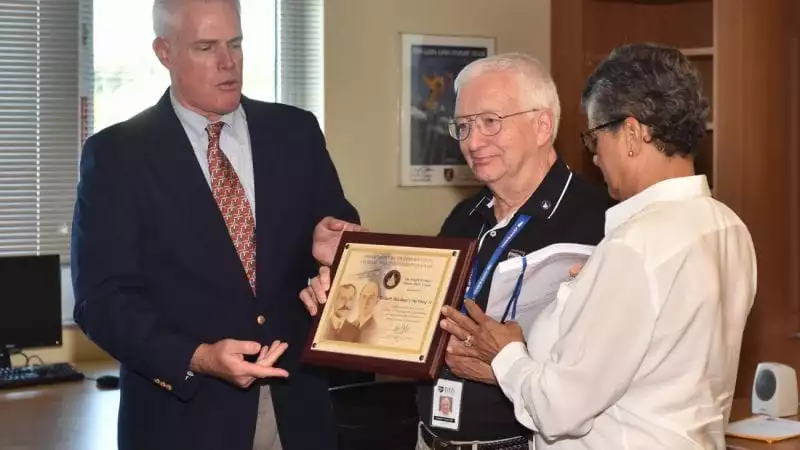Polk State Aerospace Program Coordinator Receives FAA’s Highest Award

Polk State Aerospace Program Coordinator Mike Courtney, center, receives the FAA's Wright Brothers Master Pilot Award from the FAA's Robert Jex with his wife Doris by his side.
In his 52-year career as a pilot, Mike Courtney flew for three major airlines, accumulated 24,000 flight hours, met the stewardess who would become his wife, and watched with pride as his two sons also fell in love with aviation.
It was a career that brought him immense joy and fulfillment, and on Friday, the Federal Aviation Administration’s highest honor, the Wright Brothers Master Pilot Award.
“It is an honor and a nice capstone,” said Courtney, a program coordinator for Polk State Aerospace. “But aviation is a team effort. The people I worked with are responsible for this.”
Downplay it as he might, the Master Pilot Award is no small achievement. The FAA’s most prestigious honor, it recognizes those who have “exhibited professionalism, skill, and aviation expertise for at least 50 years,” according to faasafety.gov.
“Mike’s record has been one of the best. His resume reads like a dream career to any aspiring airline pilot, and it is most fortuitous that Mike serves in a position of significant influence at Polk State College, where he can help young practitioners of his beloved profession succeed in their aviation endeavors,” Orlando FAA Safety Team Program Manager for Operations Robert Jex said during the presentation of the award Friday morning at Central Florida Aerospace Academy.
Courtney, who became enamored with aviation at 6 years old, when he would watch planes land and take off from McGhee Tyson Airport near his childhood home in Maryville, Tenn., began his career in 1964, when he made his first solo flight. In the five decades that followed, he worked as a pilot for Eastern Airlines, Sun Jet International Airlines and Southeast Airlines, as well as an aircraft accident investigator and analyst for Aerosafe, Inc.
During that time, he witnessed the aviation industry evolve both in terms of the technology in the cockpit as well as its management of onboard personnel.
“When I first started, pilots were expected to be tough. Most of the people I flew with were former World War II pilots. They were in charge of everything and didn’t need anyone. The idea was that if airlines hired the right pilots and trained them well enough, there would be no mistakes,” Courtney said.
Today, while pilots are still ultimately in charge, airlines take a team-based approach to crew management, Courtney said.
“The industry has realized that humans will always make mistakes. Preventing tragedy is about trapping, discarding, and remediating those mistakes, and to do that, the crew has to operate as a team,” he said.
Over the course of his career, Courtney experienced much personal change, too.
In 1969, en route from Chicago to San Juan, Puerto Rico, Courtney needed to leave the cockpit to use the restroom. At the same moment that he reached for the cockpit door handle, a stewardess on the other side was inserting her key, which was attached to her uniform, into the lock to bring the pilots their lunch. When Courtney pulled the door open, the bottom half of the stewardess’s uniform ripped away, leaving her exposed from the waist down in front of a plane full of passengers.
From that awkward introduction, love grew. Courtney and Doris married and had two sons — Rob and Alan — both of whom are also airline pilots.
“The first time I flew in the jump seat behind my sons, I got tears,” Courtney said.
“Once in Atlanta, I was landing, and the pilot in the plane behind me said over the radio, ‘Dad, is that you?’ It was Rob. Once, over Charleston, W.Va., I heard over the radio, from the plane 2,000 feet above me, ‘Hey Dad, how are you doing down there?’ It was Alan. You can’t buy things like that.”
For all the change he knew in his career, both personally and professionally, one thing that never changed was the honor of being entrusted with an aircraft and human lives.
“You’re piloting 600,000 pounds of metal worth a quarter of a billion dollars. You might be taking off in a blizzard in the middle of winter. Your job is to move that airplane with such precision and care that the people on board wouldn’t even know, if they closed their eyes, that the plane had moved. There is nothing as fulfilling as that,” Courtney said.
Three years ago, his flying career behind him, Courtney joined Polk State Aerospace as a program coordinator. In that role, he strives to impart lessons from his half-century of experience to the next generation of pilots.
“I try to teach them that from the first day they are involved in aviation, it is a professional exercise. They have to put all their effort into everything they do. They have to have something the industry calls ‘conscientious compliance,’ which means they have to do the right thing whether someone is looking or not. That’s the key to safety,” he said.
Courtney’s experience adds immense value to Polk State Aerospace, said Aerospace Professor Ryan Wallace, who nominated Courtney for the FAA award.
“I have the great privilege of teaching aviation history, but Mike has lived it,” Wallace said. “There is no greater resource than Mike.
“It’s sometimes difficult to make concepts concrete for students, but Mike is able to do that through his firsthand experience of historical incidents and scenarios. He has close connections to some of the case studies we present in our program. It inspires and excites the students and makes it real. We wanted to show our appreciation.”
Polk State Aerospace offers the Associate in Science in Professional Pilot Science, the Associate in Science in Aerospace Administration, the Associate in Science in Aviation Maintenance Administration, and the Bachelor of Science in Aerospace Sciences, which has concentrations in both Pilot Science and Administration.

